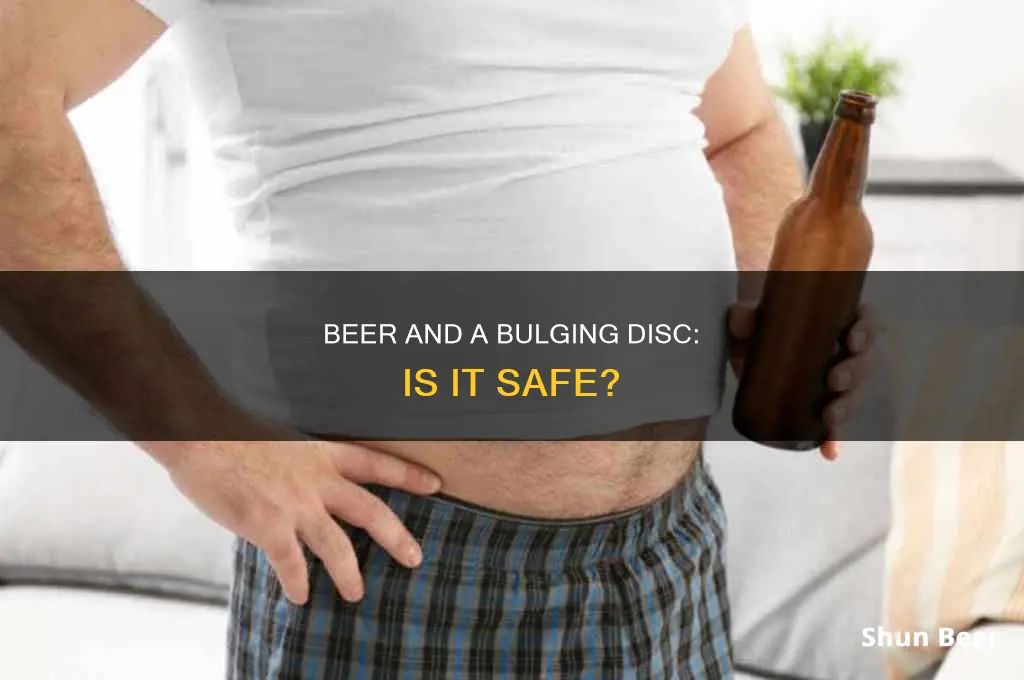
I assume you mean a bulging beer can, rather than a bulging disc. In that case, the answer is that it depends. Bulging cans can be caused by a number of factors, including damage during shipping, changes in air pressure during transportation, manufacturing defects, or exposure to extreme temperatures. If a can is bulging, it should be opened carefully and outdoors, and should not be consumed if it smells or looks odd.
What You'll Learn

Is it safe to drink a bulging beer can?
Bulging beer cans are a common occurrence, and there are several reasons why this might happen. The most likely explanation is that the cans were dropped or shaken during shipping, causing the bottoms to buckle under pressure. Other possibilities include pressure changes during shipping or exposure to extreme temperatures, which can cause the cans to freeze or get super hot and increase internal pressure. In rare cases, it could be a sign of refermentation, but this is less likely if only the bottom of the can is bulging.
So, is it safe to drink a bulging beer? Opinions vary. Some people advise against it, fearing that the can might explode or that the beer has gone bad and could be dangerous to consume. However, many others have shared their experiences of drinking from bulging cans without any ill effects. If you decide to go ahead and open the beer, it is recommended to do so outside and to use your senses to check if the beer looks or smells strange before drinking it. If anything seems off, it's best to discard the beer.
It's worth noting that botulism is highly unlikely to be an issue, as the preservatives and acidity in beer and other carbonated drinks typically prevent this. However, if you have any concerns about the safety of the beer, it's always better to err on the side of caution and avoid consuming it.
To prevent this issue in the future, it's recommended to store beer cans properly and avoid exposing them to extreme temperatures or physical damage that could cause the bottoms to bulge.
Beer and VSG: What You Need to Know
You may want to see also

What causes beer cans to bulge?
There are several reasons why beer cans might bulge. One of the most common causes is a change in pressure during shipping. This can happen when a case of beer is dropped, causing a downward pressure that results in the bottom of the cans buckling. Beer cans can also bulge due to pressure changes when they are exposed to extreme temperatures, such as being left in a hot car. In addition, the curvature of the bottom of the can may not be strong enough to resist the pressure of the carbonation in the beer, causing the can to bulge. Finally, in rare cases, bulging cans could indicate the presence of botulism, which is caused by a buildup of pressurized gas inside the can. However, this is unlikely in the case of beer due to the presence of preservatives and the acidity of the beverage.
When faced with a bulging beer can, it is recommended to exercise caution. Some sources suggest that it is safe to open the can outdoors and check if the beer smells or looks strange before consuming it. However, others advise against opening a bulging can at all, as there is a risk of explosion. In any case, it is important to handle bulging cans with care and to prioritise safety.
While a bulging can may not necessarily indicate a problem with the beer itself, it is always recommended to follow safe food and beverage handling practices. If there is any doubt about the safety of the beer, it is best to discard it.
To prevent beer cans from bulging, it is important to store them properly and avoid exposing them to extreme temperatures or physical damage, such as dropping a case of beer. Additionally, some sources suggest that the manufacturing process may play a role, with thinner can materials being more susceptible to bulging.
Sprite vs Beer: A Healthy Alternative?
You may want to see also

How to identify if a beer has gone bad?
Bulging beer cans are often the result of a drop or knock, causing the bottom to buckle. It could also be due to changes in pressure during shipping or exposure to extreme temperatures. However, it is generally not safe to consume the beer if the can is bulging, as there is a risk of explosion or bacterial infection.
Now, here is how to identify if a beer has gone bad:
Appearance
Look for any changes in the appearance of the beer, such as a change in colour or the presence of sediment or floating particles.
Smell
Give the beer a sniff; if it smells sour, vinegary, cheesy, or like vomit, it has likely gone bad. Other off-putting smells include soap, propane, plastic, band-aids, metallic, mouldy, or musty odours.
Taste
Take a small sip and pay attention to the taste. If it tastes buttery, fruity, grassy, yeasty, sour, or sweet, it may be a sign of off-flavours. Other undesirable tastes include astringency, causing a mouth-puckering sensation, or saltiness.
Mouthfeel
Pay attention to any sensations in your mouth, such as a burning or biting feeling at the back of your mouth and throat, which could indicate the presence of fusel alcohols. A drying sensation in your mouth could be a sign of astringency.
Carbonation
Check if the beer has the appropriate level of carbonation for the style. Aging can sometimes decrease carbonation, making the beer fall flat.
Storage Conditions
Consider the storage conditions of the beer. If it has been exposed to sunlight or artificial light, it may have developed a skunky flavour. Beer should be stored in a cool, dark place to prevent spoilage.
Remember, if you have any doubts about the quality of the beer, it is better to discard it than risk consuming something that could be harmful to your health.
Beer and Phentermine: What's the Harm?
You may want to see also

What are the dangers of drinking a bulging beer can?
Bulging beer cans are often caused by a buildup of pressure inside the can. This pressure could be caused by carbon dioxide gas that builds up if the beer has spoiled or continued fermenting. The gas has nowhere to escape, so it puts pressure on the can until it creates a bulge.
Drinking beer from a bulging can may be dangerous due to the risk of bacterial contamination and the potential for the can to explode.
Dangers of Drinking a Bulging Beer Can
Bacterial Contamination:
Beer that has spoiled or undergone secondary fermentation may be contaminated with bacteria or other microorganisms. Consuming contaminated beer poses a risk of foodborne illness, which can cause gastrointestinal symptoms such as nausea, vomiting, diarrhoea, and abdominal pain.
Explosion Risk:
The buildup of pressure inside the can may lead to an explosion upon opening or even spontaneously. This could cause injury and create a mess. It is recommended to open such cans cautiously and preferably outdoors to minimise the risk of injury.
Alcohol Content and Calories:
While not directly related to the bulging can, it is important to consider that beer is high in calories and alcohol content. Regular consumption of more than one beer per day or binge drinking can lead to weight gain, including belly fat, and increase the risk of various health problems.
How to Assess if a Bulging Beer Can is Safe to Drink:
- If the bulge is small and the can feels firm but not rock hard, it may be safe to open and drink. However, if the bulge is larger than a golf ball, it is best to dispose of the can.
- Check for signs of leakage or sharp dents, which could indicate a rupture and exposure to air and contamination.
- Pour the beer into a glass and examine its appearance and smell. If it looks cloudy, has an unusual colour, or emits a strange odour, it is best to discard it.
- If the beer passes the visual and smell tests, take a small sip to assess the taste. If it tastes funny or sour, it is likely spoiled or contaminated, and you should not consume it.
In general, it is advisable to prioritise safety and discard any beer can that appears suspicious or raises concerns. It is not worth risking your health for the sake of consuming a potentially unsafe beverage.
Insulin and Beer: Is It Safe to Drink?
You may want to see also

What to do with a bulging beer can?
A bulging beer can is often a sign of too much carbon dioxide (CO2) building up inside. This could be due to a variety of reasons, such as storage at high temperatures, the contents going bad, continued fermentation, or a problem with the can itself. Another common cause is the can being frozen, which causes the beer inside to expand and pop out the bottom of the can. If you're sure this is the cause, the beer will probably be okay to drink.
If the bulge is small and the can feels firm but not rock hard, it may be safe to carefully open and drink. However, if the bulge is larger than a golf ball, it's best to dispose of the can. If the sides of the can have some give when squeezed, there is not too much pressure buildup, and it should be safe to open and check the contents.
To check if the beer is still good, cautiously open the can and pour the contents into a glass. Then:
- Check for a strange smell. If it smells odd or unpleasant, it's likely gone bad.
- Look for changes in colour or cloudiness, which could indicate spoilage.
- Take a small sip to see if it tastes funny or sour. If it does, the beer may be spoiled or contaminated.
Remember, it's always better to be safe than sorry when it comes to food and drink safety. If you're unsure, carefully dispose of the can.
Drinking Beer at Work: Is It Ever Okay?
You may want to see also
Frequently asked questions
A beer can bulges due to pressure buildup inside the can. This could be caused by carbon dioxide gas that builds up if the beer has spoiled, continued fermenting, been frozen, or been stored at high temperatures.
If the bulge is small and the can feels firm but not rock hard, it may be safe to carefully open and drink. However, if the bulge is larger than a golf ball, it's best to dispose of the can as it could burst and cause injury.
Cautiously open the can and pour the beer into a glass. Check if it has a strange smell, looks cloudy or has a different colour, or tastes funny or sour. If it fails any of these tests, it's best to throw it away.
It's very unlikely as beer is usually too acidic and contains alcohol, which inhibits the growth of the Clostridium botulinum bacteria. However, if you're worried, it's best to dispose of the can.
Check the can for any signs of leakage. If there is leakage, throw the can away as it has been exposed to air and possible contamination. If the can is still sealed and airtight, carefully open it and check the beer as outlined above.







